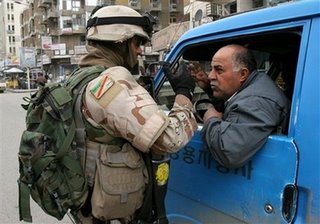
By Tim Kilbride
Special to American Forces Press Service
WASHINGTON, Feb. 7, 2007 - Despite ongoing violence and intimidation around the country, Iraq's police forces are steadily growing in numbers and professionalism, the U.S. Army general who oversees Iraqi police training said today.
U.S. Army Maj. Gen. Kenneth Hunzeker, who previously served on the Joint Staff and commanded the 1st Infantry Division as it returned to the United States from Germany, assumed control of Multinational Security Transition Command Iraq's Civilian Police Assistance Training Team in October.
During a telephone question-and-answer session with bloggers and online journalists today, Hunzeker explained that his organization is working to help the Iraqi government, specifically the Ministry of Interior, assume sole control of the Iraqi National Police, the Department of Border Enforcement, and the chiefs of police and forces of Iraq's 18 provinces.
"We've trained and equipped them, and now we're trying to go to the next level with different training programs and different initiatives," Hunzeker said. "What I see on a daily basis is great leaders, great 'shertas' (police officers), putting their lives on the line and truly becoming a more professional force."
Recruitment figures among police forces have climbed throughout most of the country, Hunzeker said. In a televised briefing earlier in the day he noted, "We have trained more than 200,000 policemen and women, more than 19,000 above our target goal." However, he said, the effort is affected by underlying stability in each province.
"In the troubled areas -- it's those six provinces you hear about all the time where there's a lot of violence and the like -- that's truly your challenge as you go through this. Recruiting there is not at the numbers we would like," he told the online journalists, but, he noted, "we're still fairly successful."
Recruitment numbers in Anbar province have jumped recently, a change Hunzeker credited to increased rallying efforts by Marine expeditionary forces in the region and provincial sheiks, whose attitudes by way of insurgent violence he described as "I'm not going to take it any more."
Hunzeker said coalition forces are working with Anbar police chiefs to rapidly build the capacity to support and utilize the new strength, with results quickly becoming manifest.
"I think you're seeing the effects of it on the ground," he said. "I think we have turned the corner in al Anbar in many ways."
In Iraq's 12 mostly peaceful provinces, the general pointed to steady progress in institutionalizing law and order. "We're beginning to establish the rule of law, and the prisons and the courts are catching up, and the policemen are the action arm there," he said.
Enabling an effective, loyal and independent police force at the provincial level is essential to standing up the national government, Hunzeker explained.
"When you talk about the 18 different provinces and the 18 different police chiefs that exist out there, ... they clearly are in charge," he said. "They sit as the police chiefs for those provinces based upon the provincial councils that exist, so they have the ability to hire and fire out there. And it becomes their province and their police, which is so powerful when you talk about a unity government and the 18 different provincial governments underneath it."
Hunzeker extended his support for the Iraqi police in his description of Iraqi Interior Minister Jawad Bolani.
"He clearly gets it, and he's part of the solution, and he is the future of Iraq when it comes to what we're doing for Iraqi security forces," Hunzeker said. "He's dedicated; he's honest; and he doesn't take any nonsense when it comes to misbehavior."
Relaying a statement from Bolani about the forces under him, Hunzeker said, "Every day they make sacrifices for their country, where they are on duty serving and protecting their citizens despite all the challenges facing them."
Responding to allegations of militia infiltration within Iraqi police forces, Hunzeker framed the problem more as one of "intimidation" than infiltration, calling it a "gray area." He explained the difference in the Iraqis' perspective between "good militia and the bad militia."
"It's clearly a challenge," he added.
Hunzeker said that militias historically stand up to fill a security void. "Once the security forces are up and the numbers, and they have the faith and confidence of the electorate and the people of Iraq, then those militias will go away," he predicted.
The general admitted the pace in Iraq can be frustrating, likening it to "turning the aircraft carrier into the wind a little bit in some cases," but added, "Change is taking place."
Hunzeker explained that Iraq does not have a culture of immediacy and that the police force is standing up against a history of corruption and neglect under Saddam Hussein. However, he cautioned, "If it's going to be an Iraqi solution, it's got to be their way, and it's got to be their solution."
In spite of the challenges, Hunzeker expressed optimism that the Iraqi police will continue to grow in strength and professionalism.
"They are absolutely so positive, so incredibly upbeat, recognizing that, you know, they are the future of Iraq," he said. "They get it, so we better get it."
(Tim Kilbride is assigned to American Forces Information Service.)
[Web Version: http://www.defenselink.mil/News/NewsArticle.aspx?ID=2969]

1 comment:
Hooray for Iraq's policemen! I hope they grow stronger each day and beat the hell out of the enemy so that their countrymen can live in peace with honor.
Post a Comment